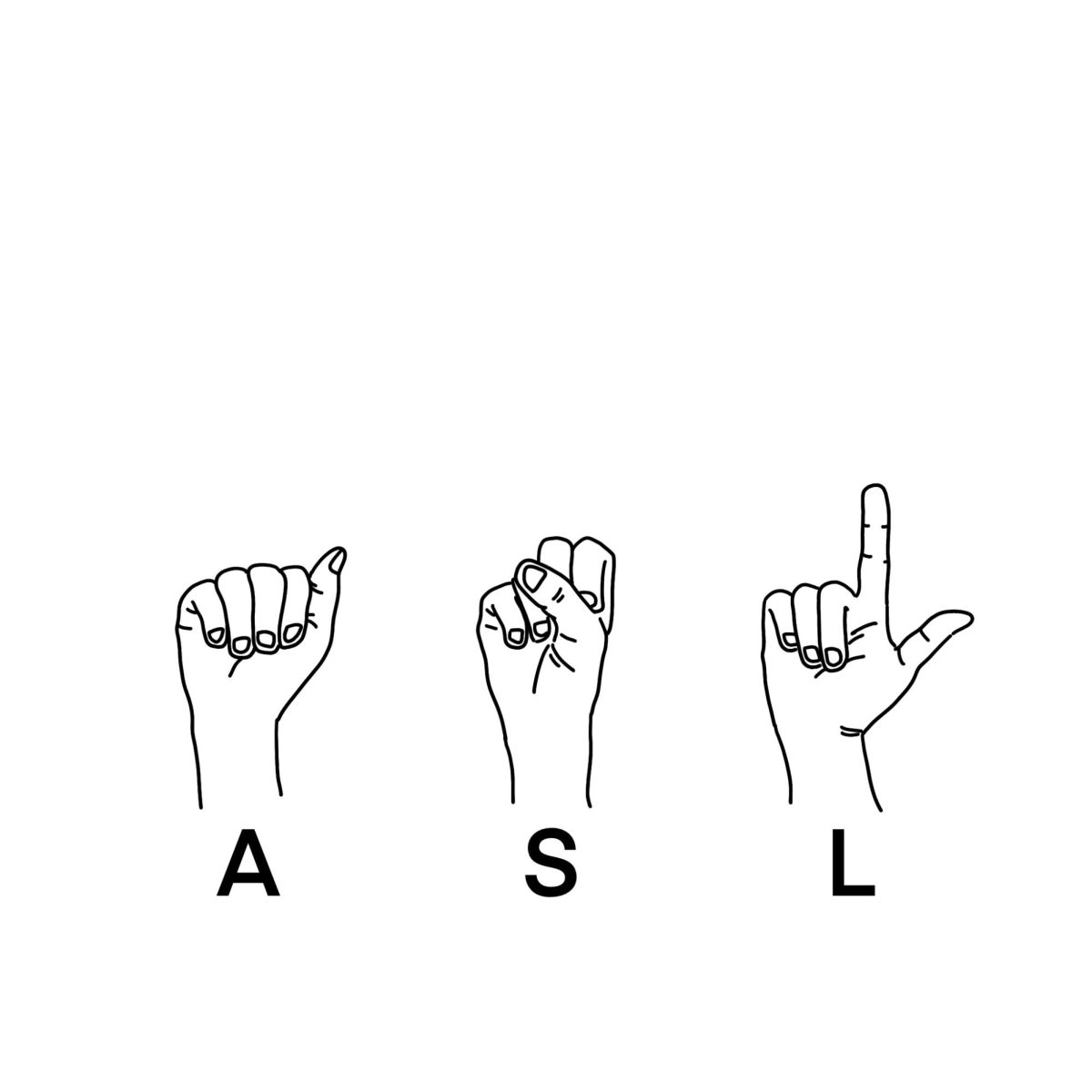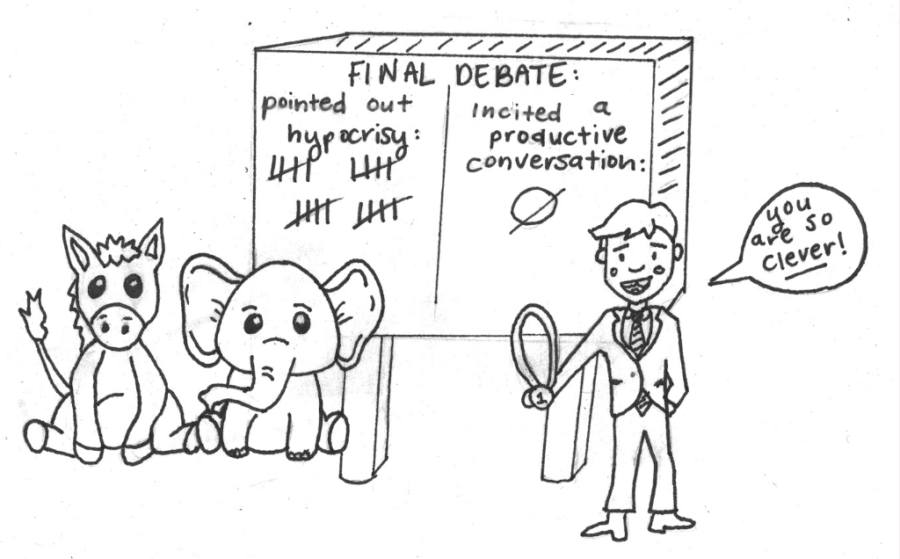Is it useful to claim political hypocrisy?
Rather than encouraging healthy discussion, arguing over hypocrisy often leaves one side feeling defensive and the other with a false sense of intellectual superiority.
February 9, 2023
During political debates, whether on national TV or around the family dinner table, people often use a variety of repetitive tactics in attempts to prove themselves right, or at least the opposing side wrong. Though there is no shortage of arguments that end in dissatisfaction as both parties dig their heels in, there is one particular talking point that feels especially futile. When someone argues that an opposing person or group is being “hypocritical,” it’s difficult to feel like the conversation can be productive.
Hypocrisy goes beyond political debates, and for the sake of simplification, can be divided into two categories.
Most dictionaries will say that hypocrisy is the trait of arguing for one belief, while carrying out contradictory actions, often secretly. In short, this first form of hypocrisy applies to anyone who could use the phrase, “do what I say, not what I do.”
However, in political arguments especially, a slightly different concept of hypocrisy also seems to pop up. Rather than referring to deceptive actions, this second type of hypocrisy applies to groups or people that may appear to hold multiple contradictory beliefs.
For instance, conservative talk show hosts like Tucker Carlson love to claim hypocrisy in liberal ideas about bodily autonomy. These hosts attempt to pit liberals against their own slogans, like “my body my choice,” by questioning why phrases like that don’t seem to align with other liberal views. For example, they might see support of vaccine mandates or gun control as positions that conflict with the belief in choice.
Beyond the world of hosts who make a living by yelling through TV screens, the hypocrisy argument is used on both sides of the party divide. It is just as common to see conservatives targeted for hypocrisy as it is for liberals to face that same critique.
To be clear, from my perspective there is a significantly more wild hypocrisy in conservative arguments, and it feels like a prime “gotcha” moment for me to point it out. For instance, if anyone ever tells me they are pro-life but support the death penalty, the hypocrisy argument immediately comes to the tip of my tongue.
However, hypocrisy that seems so blatant to me likely won’t seem that way to the opposing side, and pointing it out, while initially satisfying, never seems to make anyone reconsider their position.
The issue is that everyone’s concept of hypocrisy is based on their own intrinsic values. While it may seem obvious to me that claiming to be “pro-life” while supporting the death penalty is hypocritical, that is based on my own beliefs about reproductive rights and punishments for crime, rather than a blanket definition of the “pro life” slogan that we all subscribe to. If two people enter a conversation with very different values, claims of hypocrisy from either side rarely seem to lead to anything but collective dissatisfaction.
In other words, as an opinion article on the left-wing independent news site, Novara Media, describes, “People are capable of being contradictory, but at the same time, there is usually some degree of ideological consistency to what appears like hypocrisy.”
In addition to often ignoring the underlying morals behind arguments, claiming hypocrisy often relies on the assumption that there is simple truth in complex issues. For instance, if you claim someone is hypocritical for believing in free speech while also believing in punishment for hate speech, you’re acting as if “free speech,” as a concept, is simple and indisputable. In reality, free speech has always included exceptions, which many Americans agree with. The Supreme Court has upheld several of these exceptions, such as defamation, threats, and sexual obscenities. In the case of free speech, claiming hypocrisy ignores widely recognized nuances in our constitutional rights, and acts as if no exceptions exist at all.
Another similar oversight in the hypocrisy argument is that it often ignores virtually all context. Like many similar debate buzzwords, “hypocrisy” ignores context in the same way it ignores nuance.
Take the recent panic over gas stove bans, for instance. Recently, a commissioner of the Consumer Product Safety Commission (CPSC) responded to public health concerns about the link between gas stoves and childhood asthma by suggesting a potential ban. In response, conservatives latched onto their household appliances as a symbol of freedom, and attacked the Biden administration for the suggestion of bans.
In this bizarre culture war debate, Biden has been targeted for both forms of hypocrisy. Some attacked him for using his own gas stove, and others argued that a gas stove ban would go against liberal beliefs in personal choice.
For instance, Christina Pushaw, an aide for Governor Ron Desantis, tweeted that “Biden will ban gas stoves for normal people. Not for elites. This is Soviet America: Rules for thee, not for me.”
Through these inflammatory statements, Pushaw provides yet another example of the commonly used hypocrisy claim by using the phrase “Rules for thee, not for me.”
What this fixation on hypocrisy missed, though, was that Biden never intended to ban gas stoves. White House Press Secretary Karine Jean-Pierre explicitly confirmed that the CPSC would not ban gas stoves, after an onslaught of conservative backlash on the issue. With this added context, the hypocrisy claims fall flat, revealing a dramatic and unnecessarily fearful conservative perspective.
Whether hypocrisy arguments ignore context, nuance, or underlying beliefs, they nearly always act as conversation enders. Rather than encouraging healthy discussion, they leave one side feeling defensive and the other with a false sense of intellectual superiority. If you find yourself reverting to hypocrisy claims, you might be more eager to win the argument than to understand the opposing side.
Though it will always be difficult to engage in empathetic conversations with people on the opposite side of the political spectrum, simply claiming hypocrisy is not the way to go about it. Instead, sincere questions and calm explanations can hopefully bridge political gaps in a world of constant polarization.
At the very least, if you just can’t help yourself from pointing out hypocrisy, explain the context and nuance behind your claim and truly listen to their response.

























